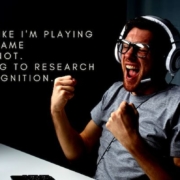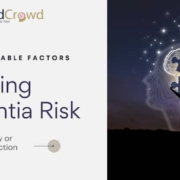High Blood Pressure and your Brain Health
It’s not only your heart. High blood pressure increases the risk for brain aging, memory problems, cognitive decline and even Alzheimer’s disease. Keep reading!
High blood pressure or hypertension is a common condition in the U.S. population. Would you like to know how high blood pressure causes memory problems and affects your brain health? And your cognitive abilities? Basically, how your brain works to help you think, reason, learn, and remember things.
So, let’s talk about that!
How is Hypertension Diagnosed?
A medical professional can diagnose hypertension by measuring blood pressure with an upper arm “cuff” device.
High blood pressure is diagnosed when your “top” number is higher than 130 or your “bottom” number is greater than 80.
Both numbers refer to the pressure your blood applies against your artery walls.
- The “top” number or systolic pressure, is the pressure when the heart beats.
- The “bottom” one is the diastolic pressure or the pressure when the heart is resting.

The incidence of high blood pressure is related to age. Less than 10% of young adults between 18-39 have high blood pressure. This percentage increases to over 60% in those over age 60.
Hypertension is not a normal part of the aging process. It is a disease.
It damages your heart, blood vessels, eyes, kidneys, brain and other internal organs. According to the American Heart Association, understanding your blood pressure readings is key to managing them.
Often called the “silent killer” because many of its effects are not noticeable unless tested by a medical professional. For this reason, it is important to get regular medical checkups even if you feel healthy. No skipping those yearly physicals!
How can High Blood Pressure Damage my Brain?
How can high blood pressure damage my brain? I thought this was all about protecting my heart?
It is true that the damage from hypertension starts in your heart… but also in your blood vessels. Your heart is a biological pump and high blood pressure makes that pump work harder. Over time this extra effort can weaken the heart and make your circulatory system work less efficiently and put you at risk of heart failure.
Elevated blood pressure also damages the delicate cells that populate your blood vessel linings. This, in turn, leads to an even further increase in blood pressure. It is a like a car with no brakes and it becomes difficult to control it and slow it down once it starts.
Be part of the solution. Help scientists understand how to prevent dementia. Take the MindCrowd test today 👉 mindcrowd.org
MindCrowd is a scientific study that gives researchers a set of data baselines about how normal, healthy brains perform at different ages.
MindCrowd cannot diagnose dementia or predict the risk for cognitive decline. By taking this quiz you will help researchers in the future to more properly evaluate Alzheimer’s patients and usher in a new era of precision aging.
Test your brain 👉 mindcrowd.org 🙏
Effects of High Blood Pressure on the Brain: Memory Issues
Your brain – and, in fact, all your organs – relies on good blood flow to bring oxygen and fuel to it and to clear away waste products.
Long-term hypertension can result in lower blood flow to your brain cells. That means less oxygen, less fuel, and less removal of waste products, and all that can be bad for your brain health.
High blood pressure is also tied to greater malfunction of the brain’s white matter. White matter is the part of the brain that contains the axons of the nerve cells. Nerve cells use these axons to communicate signals to the brain nerve cells.

This communication is key for proper and optimal brain function. Hypertension tends to damage these axons and thus impair nerve cell communication.
And as mentioned earlier, high blood pressure harms the brains’ blood vessels. This can give rise to vascular dementia. It also impacts the brain’s ability to receive oxygen and fuel and remove waste materials.
If your brain blood vessels clog or burst it can cause a “stroke”. This can result in immediate cognitive consequences that may last for the rest of your life. Maintaining a healthy circulatory system is critical to your memory and to your brain health. It will help you keep your best cognitive abilities.
High Blood Pressure and Memory Problems: Is Hypertension a Risk Factor for Alzheimer’s and other Dementias?
The short answer is, yes.
High blood pressure has shown to speed up the earliest indicators of Alzheimer’s disease.
Especially when it starts in mid-life.
People’s brains shrink or atrophy at higher levels than other people their age. Or they develop biological markers of the disease like amyloid. A part of the hallmark amyloid plaques. Or tau tangle formation that we observe in the brains of Alzheimer’s patients at death.
Does High Blood Pressure Cause Memory Loss and Confusion?
Untreated high blood pressure can cause memory problems and affect problem-solving abilities.
Two of the most sensitive forms of cognition affected by hypertension are:
- executive functioning
- processing speed
Executive functioning includes complex mental skills that demand memory, thinking, and self-control. These cognitive actions are central to our daily living. We use them when paying attention, regulating emotions, and starting and completing tasks.
Processing speed refers to the length of time it requires to do a particular mental task. That is, how long it takes us to take in information, make a decision on the appropriate reaction. It is functionally related to things that we must do all the time.
Other types of cognitive functioning can be affected as well, but these two aspects seem to be the most affected. And we can all agree that they are extremely critical to our every day lives.
How is your memory today?
Find out by taking the MindCrowd memory test online. Help bring us closer to a cure for Alzheimer’s and other dementias.

Should I Lower my Blood Pressure?
Maintaining normal blood pressure is crucial not only for the health of your heart but also for your brain.
If you have been diagnosed with hypertension:
- work with your physician to devise a treatment plan
- follow the treatment plan to lower your blood pressure
- eliminate other known risk factors such as smoking, lack of exercise, and stress
This is true for all ages, but particularly true for young to mid-life adults. Everyone should strive to maintain a normal blood pressure!
Matt Huentelman, Ph.D. is a neuroscientist and a human genetics researcher. His laboratory studies how the brain ages and explores various ways in which we can prevent brain aging and protect against diseases of the aging brain like Alzheimer’s disease. His lab is based at TGen in Phoenix, Arizona, and he is also the lead scientist for the MindCrowd project.
MindCrowd is an internet based study of the brain that anyone 18 years of age or older can join and it can be found at mindcrowd.org









It really stood out to me when you mentioned that hypertension is something that can damage your brain and your heart. It seems like hypertension is something that you would want to treat as early as possible in your life. Working with a cardiologist seems like a good way to catch hypertension when it is in the early stages of development.
Monitoring blood pressure is really important that everyone should consider.